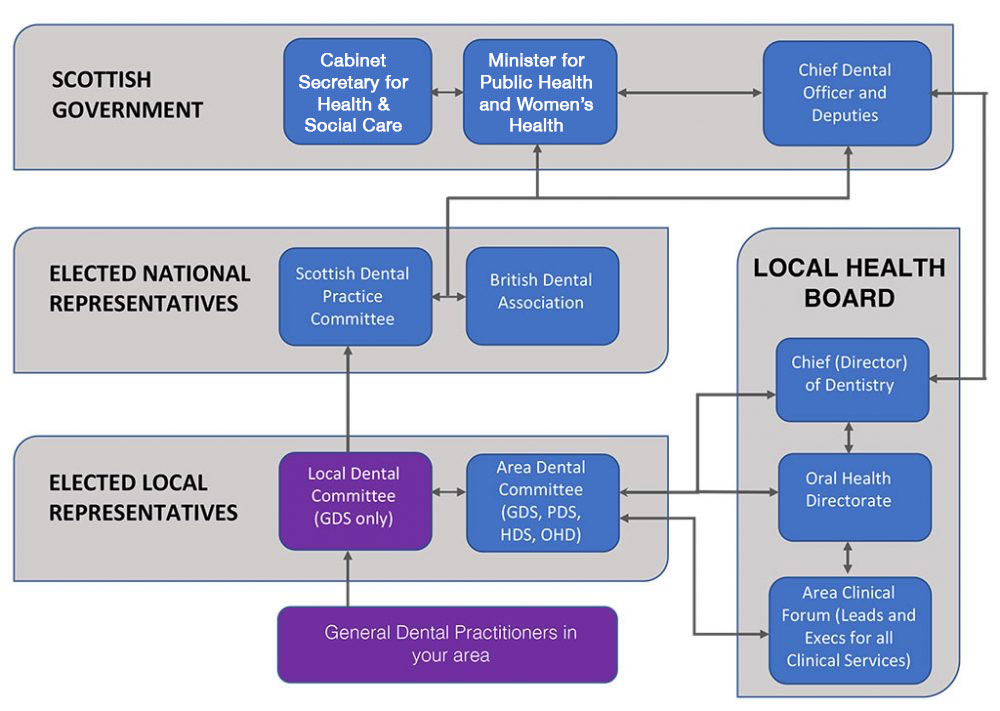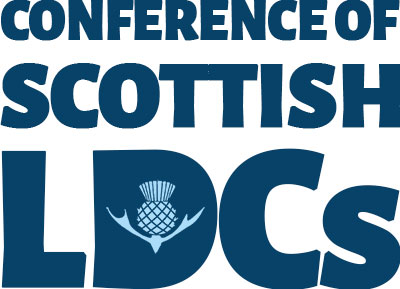Conference of Scottish Local Dental Committees
The annual Conference of Scottish Local Dental Committees brings together representatives of each active Local Dental Committee in Scotland to discuss policy and the concerns of the dental profession.
This page is dedicated to the structure, remit and history of Local Dental Committees in Scotland and gives you information on how you could become involved. The event is organised by the Conference Agenda Committee (CAC). Find out more about CAC, its members and remit, here.
The Role of the Conference of Scottish LDCs and the Conference Agenda Committee
What is the purpose of the Conference of Scottish LDCs?
- To bring LDCs together to discuss political issues and topics facing the general dental service in Scotland.
- Provide CPD and sharing of best practice.
- To encourage networking amongst GDPs.
Who attends the Conference?
- Members of the Conference Agenda Committee
- LDC representatives
- SDPC representatives
- VDP representatives
- Sponsors
- Speakers
- BDA staff
- Other guests
Where does the Conference take place and when?
The Conference usually takes place on a Friday each year in April at the Stirling Court Hotel in Stirling. In 2021, the Conference took place virtually for the first time due to Covid-19 and the restrictions placed on mass gatherings. A quota of invited guests/attendees attend the pre-conference dinner the night before the Conference and stay overnight at the hotel.
What does the Conference agenda usually include?
There are sessions from various speakers on topical issues. Past examples include MSPs; the Minister responsible for dentistry; Dento-legal Advisors from indemnity organisations; the GDC and many more. Motions are submitted by each LDC which are proposed by representatives on the day and debated. Motions passed are then debated by the Scottish Dental Practice Committee, and if passed for a second time, are taken forward as policy for negotiation with the Scottish Government.
How do I attend the Conference?
Due to a limited number of spaces, each LDC has a quota for the number of representatives they can send to the Conference each year. Each LDC decides who they plan to send, and these names are submitted to the Conference Secretary.
How LDCs fit into Scottish Dental Politics

LDC History
The foundation of the National Health Service in 1947 revolutionised the provision of medical and dental care. Now all members of the community could access treatment free at the point of delivery.
Alongside the NHS, Local Dental Committees (LDCs) were established in September 1947 to provide a forum for NHS dentists to discuss policy and highlight issues of pay and working conditions. At the time the LDCs followed the boundaries of the administrative areas of their respective Health Boards. In 1974, all LDCs were reorganised to form larger committees and this happened again in 2007 when, for instance, Greater Glasgow and Clyde came into being.
LDCs come together once a year at Conference. Prior to the Conference each LDC is invited to raise motions which, if passed, are then submitted to the Scottish Dental Practice Committee for consideration to be discussed at governmental level. During conferencee representatives are given updates by the Chief Dental Officer, Ministers or health representatives from parties represented in Holyrood. They also receive a report from the Chair of the SDPC detailing the progress on succesful motions from previous years.


What LDCs do
It is an LDC's remit to raise and discuss dental issues relating to pay and conditions, pensions and workforce.
Membership of your LDC often also confers membership of the General Practitioners’ Sub-Committee of the Area Dental Committee (commonly known as ‘the GP-Sub’). The remit of the GP-Sub is to give advice to the NHS Board (via the Area Dental Committee) on behalf of non-salaried general dental practitioners.
LDCs also engage closely with their local Health Directorate over issues affecting the delivery of dental care: patient referrals, decontamination, audit, practice inspections, patients’ treatment appeals and the out-of-hours emergency service.
While areas may differ, most LDCs hold regular committee meetings (prior to 2020 in person, recently on Zoom) to discuss these issues. Some of the most active LDCs also hold CPD events for local dentists with updates on a range of relevant topics. Mandate holders can attend these events for free while non-mandate holders pay a fee.
How are LDCs funded?
The work of local dental committees is funded entirely by voluntary mandates from GDPs in your area. The current levy works out at 0.2% of gross income, so £20 per £10,000. This very small contribution is directed towards financing the committee's work in speaking up for the profession and, in many areas, the provision of relevant CPD events.
Mandates are voluntary but LDCs represent all members of the dental team.
During the pandemic the importance of providing a strong voice for the dental team has become even clearer. LDCs and their members on the SDPC have joined colleagues from a range of organisations to highlight pay and conditions. In 2021, there has never been a more important time to engage with and support your LDC.


How to get involved
You can help to shape the health and direction of the dental profession by standing for election for your local LDC.
Each LDC consists of elected representatives from across the health board covering their geographical area. Some LDCs, particularly those in the central belt, have a full committee and regular elections. In Scotland's less populated areas a number of LDCs have become dormant and so representatives are needed to speak up for the interests of their local dental team.
LDC representatives are elected on a three-yearly cycle with a proportion of seats being contested each year. Any dentist can put themselves forward for election. If enough candidates stand for these seats, election papers are issued to all eligible dentists in the area and a vote is held. If elected it would be your role to represent the professional interests of your colleagues.
The majority of committee members are ordinary GDPs (practice owners and associates). As well considering local issues, each committee can put forward representatives to sit on the Scottish Dental Practice Committee (SDPC), the national representative body of non-salaried general dental practitioners.
The Covid-19 pandemic has resulted in a much greater interest in dental politics. While many groups have sprung up and thrived on Facebook and Social Media, participation in your local LDC represents the best way to make change happen in the long term.
